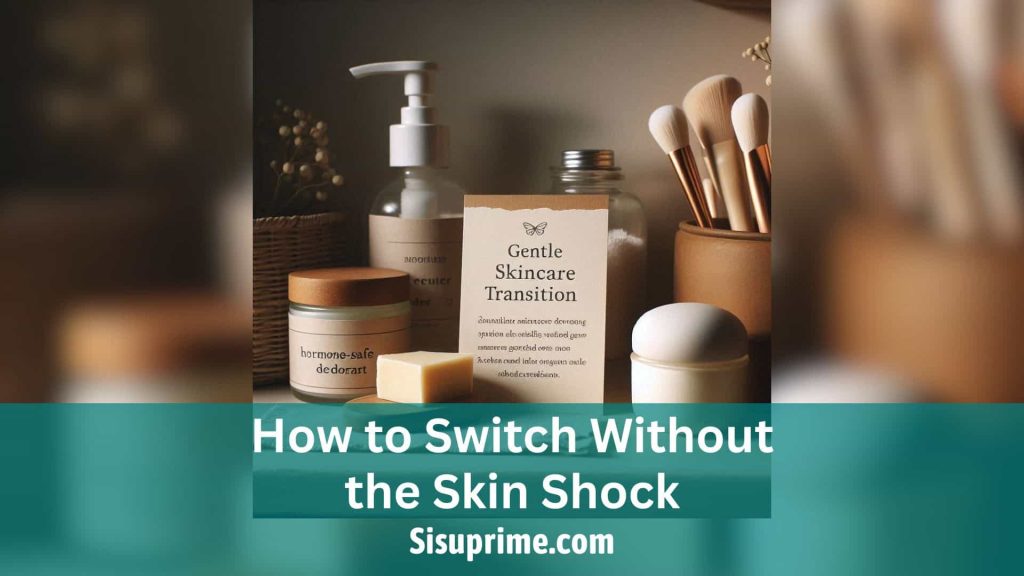Ever had your underarms react badly to a new deodorant?
You’re not alone.
Especially if you’re managing PCOS or hormonal imbalance, your skin can feel like it’s on edge.
That’s why making the switch to a natural deodorant or non-chemical deodorant needs a little extra TLC.
But with the right steps, you can glide into freshness – smoothly, safely, and purposefully.
Here’s how.

1. Why Going Hormone‑Safe Matters
You know that tingling, burning, or rash that pops up after applying a new deodorant?
I’ve felt it too.
A few years ago, after switching to what I thought was a clean aluminum-free stick, my armpits flared red and itchy.
I panicked: was I sensitive, broken, or had I merely chosen the wrong product?
Turns out the main ingredient in my new deodorant was using baking soda.
That irritant hit hard, especially during a time I was dealing with stress and PCOS symptoms.
When I finally formulated Sisuprime Prime Deodorant, a gentle, baking soda-free, aluminum-free deodorant, my underarms – and confidence – breathed a sigh of relief.
2. Why Hormone‑Safe Isn’t Another Beauty Buzz Word
New science shows why this matters:
- A recent Environmental Health News report found PFAS chemicals – linked to hormonal disruptions and fertility issues – in many deodorants labeled “natural” (tandfonline.com).
- A 2023 review in Life highlights connections between bisphenols, parabens, triclosan and PCOS, showing significantly higher levels of these EDCs in PCOS patients (researchgate.net).
- Cosmetic fragrance compounds, including phthalates and triclosan, are shown to adversely affect insulin resistance and reproductive health .
In short, don’t believe a clean body care choice would be nice to have – it could be life-changing for your hormonal health and overall women’s wellness.
3. The Roadmap: A Compassionate, Research‑Backed Transition
Switching is not the same thing as throwing away your old stick.
To nourish both your skin and hormones, follow this clear roadmap:
Step 1: Detox Gently
- Wash underarms thoroughly with pH-balanced cleanser to remove residue.
- Let skin dry fully – moisture blocks proper absorption of natural ingredients.
Step 2: Patch‑Test First
- Rub a bit on your inner arm.
- Wait 24 hours. If a rash or irritation occurs, it’s not the right product for you.
Step 3: Go Slow During the Transition
- Initial weeks: expect more sweat or odor as your skin microbiome resets (allure.com).
- Treat it like detox: take it slow, wear breathable fabrics, plan for mid-day reapplication if need be.
Step 4: Use Hormone‑Safe Deodorants
- Look for formulas free from aluminum, baking soda, parabens, PFAS, and fragrance cocktails (byrdie.com).
- Opt for proven gentle ingredients: shea butter, beeswax, clay, and mild actives like mandelic or lactic acid.
- A great example is Sisuprime Prime Deodorant – a thoughtful, non-toxic, baking soda‑free, aluminum‑free formula designed for everyone and anyone, especially people with PCOS, hormonal imbalance, and sensitive skin.
Step 5: Observe, Adjust
- After 3–4 weeks, take note of how your skin feels and smells.
- If irritation occurs, try an unscented version or different texture.
- If odor control is lacking, layer with a clean antibacterial body wash before applying. Please note that odor control is a core part of Sisuprime Prime Deodorant.
Step 6: Invite Holistic Wellness
- Combine clean body care with wellness habits – balanced diet, hydration, exercise, stress management – especially important for PCOS care.
4. Real Stories, Real Shifts
Community feedback reminds us we’re not alone:
“Mehn, my pits have never smelled this good at the end of the day. Just get ready for my family order… This one I will steal even if I don’t have money.”
“What did you put in this deo… I’ll use some on the kids tomorrow… I’ll use my finger to take it off the stick.”
These heartfelt words from Sisuprime users show that when women find a deodorant for everyone that aligns with their body and values, it becomes part of daily self-care – and community.
5. Let Research Guide Your Choices
Before you buy:
Checkpoint | Why It Matters |
Zero Baking Soda | Prevents pH imbalance and irritation (toupsandco.com, arluka.com.au, vogue.com, reddit.com) |
No Fragrance Mixes | |
Aluminum-Free | Supports natural sweat and skin health |
Gentle Actives (e.g., clay, shea butter) | Nourishes, not strips |
Clear Ingredients List | Builds trust in transparency |
When you choose thoughtfully, you’re not only preventing rash; you’re also joining a body care revolution rooted in respect for your body and future health.
6. Let Your Skin Decide - Confidently
Give it 4 weeks:
- Week 1–2: Expect adjustment – more sweat or odor, maybe mild sensitivity.
- Week 3: Signs of stabilization – skin balances, freshness improves.
- Week 4 onward: You’ll feel confident in your skin and deodorant.
Reminder: Everyone’s skin is unique – this journey is not about racing against others, but about tuning in to your needs.
7. Share Your Story with Us
Switching deodorants is personal. Now, I want to hear from you:
“How did your skin react when you switched?” Tell me in the comments – whether it was love, doubts, or something in between. Your experience could guide another woman toward hormonal wellness.
You’re Worth the Care, Shine Confidently
Moving to a hormone-safe deodorant is more than an upgrade – it’s a daily affirmation that your health, comfort, and authenticity matter.
When you prioritize non-toxic, research-backed care, you’re walking toward a healthier tomorrow.
When you’re ready for that fresh, intentional switch, try Sisuprime Prime Deodorant: a baking soda-free, aluminum-free, non-chemical deodorant created for every sweat, every skin, every hormone.
Embrace daily care with purpose – and share your journey below.
Buy Sisuprime Prime Deodorant here and step into gentle, effective freshness.
References & Sources
- PFAS in deodorants linked to hormone disruption – Environmental Health News, 2025 (researchgate.net, health.com, communitygoods.co)
- EDCs & PCOS systematic review – Life (Srnovršnik et al.), 2023 (researchgate.net)
- Phthalates & insulin resistance in PCOS – JCRPE, 2020 study (jcrpe.org)
- Risks of fragrance EDCs – Community Goods, 2025 (communitygoods.co)
- Baking soda irritation & ingredient advice – Arluka guide, 2024 (arluka.com.au)
- Gentle actives & sensitive skin deodorants – Cosmopolitan, 2025 (cosmopolitan.com)
